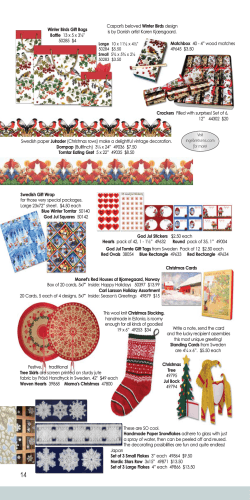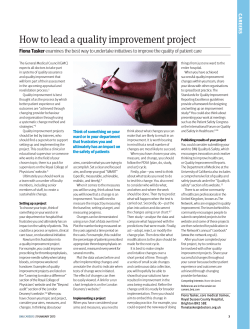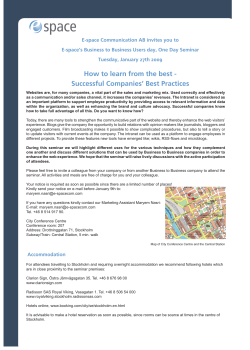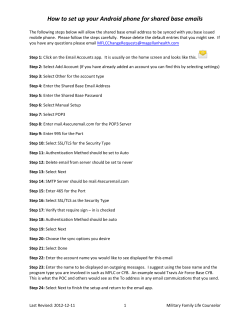
How to Use Simulation Tools to Improve Supermarkets Design and Operation Jaime Arias
How to Use Simulation Tools to Improve Supermarkets Design and Operation Jaime Arias Div. of Applied Thermodynamics and Refrigeration Dept. of Energy Technology Royal Institute of Technology Jaime Arias Dept. of Energy Technology Royal Institute of Technology Sweden Contents 1.- Introduction. 2.- CyberMart, Systems and Models. 3.- Evaluation of energy using in a supermarket. 4.- Conclusions. Jaime Arias Dept. of Energy Technology Royal Institute of Technology Sweden 1.- Introduction. Energy-saving technologies as heat recovery, floating condensing temperature, energy efficient lighting, energy efficient display cases have been implemented in several supermarkets. A systems model is necessary in order to predict and evaluate the introduction of new concepts and ideas in supermarkets. A systems model is also necessary to compare and analyse the real energy performance of new energy saving technologies implemented in supermarkets. Jaime Arias Dept. of Energy Technology Royal Institute of Technology Sweden 1.- Introduction. There are different ways to compare and study the energy using in a supermarkets. 1.- Performance Indices. Total Energy / Total Area [kWh/m2] 2.- Simulations. Jaime Arias Dept. of Energy Technology Royal Institute of Technology Sweden Task 2 – Development of performance indices for supermarkets Total energy / Total Area [kWh/m2] Data from 146 supermarkets from ICA Supermarkets Total Area 0 - 600 600 - 1000 1001 - 1500 1501 - 3000 3001 - 9000 Number 21 51 29 31 14 146 Average Area m2 463 786 1221 2066 5044 TotEner kWh 255451 389758 560433 929026 1908686 TotEner/m2 KWh/m2 551 496 459 450 378 Jaime Arias Dept. of Energy Technology Royal Institute of Technology Sweden Simulations CyberMart. CyberMart is computer program for simulation of indoor climate in different supermarkets, where the influences from cabinets, lighting, people, heat recovery, air conditioning and outdoor climate are simulated. Jaime Arias Dept. of Energy Technology Royal Institute of Technology Sweden The Supermarket System System Boundaries Electricity Ambient conditions District heating Refrigeration System District cooling HVAC System Indoor conditions t = 22C, HR = 65% Heat Cabinet System Jaime Arias Dept. of Energy Technology Royal Institute of Technology Sweden Main Program System design LCC Outdoor Climate Building Heat Rec. Indoor Climate TEWI A.C. Cold Rooms Cabinets Pipes and pumps Compressor Defrost Brine Evaporator Chiller Condenser Expansion Valve Pipes and pumps Dry Cooler Dry Cooler Fluid Jaime Arias Dept. of Energy Technology Royal Institute of Technology Sweden HVAC Model AC RHEX mfresh T1 X1 Outdoor T2 T3 X2 X3 T4 X4 Re-circulation HR T5 AH T6 Tsup msup X5 X6 Xsup Supermarket mrecir T7 mout X7 mret Jaime Arias Dept. of Energy Technology Royal Institute of Technology Sweden Air massflow Outdoor Temperature Air Cooled Condenser UAcond. Discharge Line Compressor Liquid Line Compressor Power Suction Line Expansion device Cabinet Cold Storage Evaporator Evaporator UAevap. UAevap. Jaime Arias Dept. of Energy Technology Royal Institute of Technology Sweden Completely Indirect System Outdoor Temperature Dry Cooler UAdrycooler Coolant fluid Pump UAcond. Compressor Power Chiller UAevap. Pump Secondary refrigerant UAcabinet Cabinet Indoor Temperature Jaime Arias Dept. of Energy Technology Royal Institute of Technology Sweden 3.- CyberMart CyberMart Jaime Arias Dept. of Energy Technology Royal Institute of Technology Sweden Lambohov Simulation from CyberMart No HR or FC HR and FC Ventilation [MWh/year] 93 93 Lightings [MWh/year] 112 112 Equipments [MWh/year] 80 80 Heating [MWh/year] 108 30 Refrigeration System [MWh/year] 335 263 728 72100 578 57200 Total Energy Usage [MWh/year] Energy Cost [US$/year] Jaime Arias Dept. of Energy Technology Royal Institute of Technology Sweden Jaime Arias Dept. of Energy Technology Royal Institute of Technology Sweden Jaime Arias Dept. of Energy Technology Royal Institute of Technology Sweden Lambohov Total Energy Usage 2006 Measurement CyberMart January 54193 47290 12,7% February 46811 42449 9,3% Mars 50733 47102 7,2% April 50317 47062 6,5% May 54180 50950 6,0% June 54761 52692 3,8% July 58830 57220 2,7% August 56983 55113 3,3% September 52538 51358 2,2% Total 2006 479348 451235 5,9% Jaime Arias Dept. of Energy Technology Royal Institute of Technology Sweden Lambohov Total Electricity Usage 2006 100 Out.Temp Tot.El.Meas. Tot.El.Cyb. Tot.Comp.Meas. Tot.Comp.Cyb. 07 09 Temp[°C], Power[kW] 80 60 40 20 0 -20 12 01 02 02 03 04 05 06 07 08 10 11 Time[day] Jaime Arias Dept. of Energy Technology Royal Institute of Technology Sweden Lambohov 20050401-20050406 50 Temp[°C], RH[%], Power[kW] 40 30 20 10 0 Out.Temp -10 00:00 00:00 Aux.Heating 00:00 HRSuplied 00:00 HRreturn 00:00 DCsupplied 00:00 DCreturn 00:00 Time Jaime Arias Dept. of Energy Technology Royal Institute of Technology Sweden 5.- Conclusions There is a great potential for improvement of energy systems in supermarkets. The system approach and the interconnection between the different subsystem implemented in the program CyberMart predict and evaluate the introduction of new concepts and ideas in supermarkets. A particular energy efficient solution for each supermarket is possible to achieve only when there is a balance between Costs, Environmental Impact and Performance Jaime Arias Dept. of Energy Technology Royal Institute of Technology Sweden 5.- Conclusions. The implementation of new energy saving technologies in supermarkets requires an extensive analyse of energy performances. This analysis should be done during a long period to evaluate and compare the real energy performance with the theoretical values calculated. Jaime Arias Dept. of Energy Technology Royal Institute of Technology Sweden Jaime Arias Dept. of Energy Technology Royal Institute of Technology Sweden Total Energy Usage from Compressors 2006 Measurements CyberMart Procent Jan 17018 13349 21,6% Feb 14132 11838 16,2% Mar 13951 13121 6,0% Apr 14537 13794 5,1% May 17519 15694 10,4% Jun 18840 18014 4,4% Jul 21178 21070 0,5% Aug 19269 19224 0,2% Sep 17138 16528 3,6% Jaime Arias Dept. of Energy Technology Royal Institute of Technology Sweden Building Model Heat Balance room air Heat gains to room air – Heat losses from room air = 0 Qcon – Hv * (Ts – Tr ) – Hw * (Tr – To ) – Hc * (Tr – Ts ) – Qg=0 where Qcon = Qsol. + Qp.+ Qeq. + Ql. - Qcabcon Hw : Specific loss from room air to outside W/K HV : Specific loss from room air to ventilation air W/K Hc : Specific loss from room air to room surfaces W/K Jaime Arias Dept. of Energy Technology Royal Institute of Technology Sweden Heat Balance room surfaces Heat gains to room surfaces – Heat losses from room surfaces = 0 Qrad + Hc * (Tr – Ts ) – Hac * (Ts – Tac ) = 0 where Qrad = Qsol. + Qp.+ Qeq. + Ql. - Qcabrad Hac : Specific loss from room surfaces to structure W/K Hc : Specific loss from room air to room surfaces W/K Jaime Arias Dept. of Energy Technology Royal Institute of Technology Sweden Heat Balance building structure Heat gains to structure - Heat losses from structure = Accumulated heat in structure Hac*(Ts – Tac ) – Hout*(Tac – To ) = CA*dTS /dt where CA : Total heat capacity of the room dTS : Variation of structure temperature dt : time period Hac : Specific loss from room surfaces to structure Hout : Specific loss structure to outside Wh/°K °C h W/K W/K Jaime Arias Dept. of Energy Technology Royal Institute of Technology Sweden The equivalent outdoor temperature Te = Tout + (Isol αsol + (Tsky – Tout ) *αr )/ αe Where: Tout : Outdoor temperature Tsky : Sky temperature αsol : Absorptivity for solar radiation αr : Radiative heat transfer coefficient αe : Effective heat transfer coefficient αe = αr + αc Jaime Arias Dept. of Energy Technology Royal Institute of Technology Sweden Description of calculation 1. Assumption of temperatures before cabinets and dry cooler 2. Calculation of evaporating and condensing temperature Q2 T2 = Tbrinein − εevap ⋅ m brine ⋅ cpbrine T1 = Tcoolantin + Q1 εcond ⋅ m coolant ⋅ cpcoolant Jaime Arias Dept. of Energy Technology Royal Institute of Technology Sweden Condenser and Evaporator The effectiveness of the condenser and evaporator are defined as ε = 1 − e (− NTU ) NTU is the number of transfer unit defined for the evaporator as NTU evaporator = UAevaporator m air ⋅ cpair And for the condenser as NTU condenser UAcondenser = m air ⋅ cpair Jaime Arias Dept. of Energy Technology Royal Institute of Technology Sweden Pressure drops and pumps The pressure drop f1 ⋅ ρ ⋅ w 2 ⋅ L Δpf = d The friction factor f1 = 1 ( 0 .7 9 ⋅ l n ( R e ) − 1 .6 4 ) f1 = 32 Re 2 Turbulent flow Laminar flow Jaime Arias Dept. of Energy Technology Royal Institute of Technology Sweden Pressure drops and pumps The pressure drop in evaporator and condenser Δphex = 2 ⋅ f ⋅ N p ⋅ m 2 ⋅ L ρ ⋅ de The pressure drop in cabinets Δpcab f1 ⋅ ρ ⋅ w2 ⋅ L = d The pump power Δptot ⋅ V Pp = η pump Where Δptot = Δpcab + Δphex + Δptube Jaime Arias Dept. of Energy Technology Royal Institute of Technology Sweden Condenser and Evaporator The effectiveness of the condenser and evaporator are defined as ε = 1 − e (− NTU ) NTU is the number of transfer unit defined for the evaporator as NTU evaporator = UAevaporator m brine ⋅ cpbrine And for the condenser as NTU condenser = UAcondenser m drycoolerfluid ⋅ cp drycoolerfluid Jaime Arias Dept. of Energy Technology Royal Institute of Technology Sweden Dry Cooler The effectiveness of the counter flow heat exchanger ε= 1 − e (− NTU ⋅(1−Cr ) 1 − C r ⋅ e (− NTU ⋅(1−Cr ) NTU is the number of transfer unit defined for counter flow heat exchanger as NTU HEX = UAHEX C min Cold heat capacity rate Cc = m c ⋅ cpc Hot heat capacity rate C h = m h ⋅ cph Heat capacity ratio C min Cr = C max Jaime Arias Dept. of Energy Technology Royal Institute of Technology Sweden Compressor 2N-5.2Y 13,8 kW 30 40 50 -15 14,8 12,5 9,9 -10 18,5 15,7 12,7 -5 22,7 19,5 15,9 Jaime Arias Dept. of Energy Technology Royal Institute of Technology Sweden Lambohov 20050401-20050406 50 Temp[°C], RH[%], Power[kW] 40 30 20 10 0 Out.Temp -10 00:00 00:00 Aux.Heating 00:00 HRSuplied 00:00 HRreturn 00:00 DCsupplied 00:00 DCreturn 00:00 Time Jaime Arias Dept. of Energy Technology Royal Institute of Technology Sweden Comparison Measurement - CyberMart Supermarket in Täby Centrum during one Year Temp[°C], RH[%], Power[kW] 110 90 70 50 30 10 -10 -30 12 01 03 Out.Temp.Meas. Out.Temp.Cyb. Comp.Pow.Med. Meas. Comp.Pow.Med. Cyb 05 06 08 10 11 01 Time Jaime Arias Dept. of Energy Technology Royal Institute of Technology Sweden Comparison Measurement - CyberMart Supermarket in Täby Centrum during one Year 70 Temp[°C], RH[%], Power[kW] 60 50 40 30 20 10 0 -10 -20 Ind.Temp.Meas. Out.Temp.Meas. Ind.Temp.Cyb. Out.Temp.Cyb. RH.Meas. RH.Cyb. -30 12 01 03 05 06 08 10 11 01 Time Jaime Arias Dept. of Energy Technology Royal Institute of Technology Sweden Comparison Measurement - CyberMart Supermarket in Täby Centrum one Year with same climate data 70 Temp[°C], RH[%], Power[kW] 60 50 40 30 20 10 0 Ind.Temp.Meas. Out.Temp.Meas. RH.Meas. -10 -20 Ind.Temp.Cyb. Out.Temp.Cyb. RH.Cyb. -30 12 01 03 05 06 08 10 11 01 Time(day) Jaime Arias Dept. of Energy Technology Royal Institute of Technology Sweden Comparison Measurement - CyberMart Supermarket in Täby Centrum one Year with same climate data Temp[°C], RH[%], Power[kW] 110 90 70 50 30 10 -10 Out.Temp.Meas. Comp.Pow.Meas -30 12 01 03 05 06 Out.Temp.Cyb. Comp.Pow.Cyb 08 10 11 01 Time(day) Jaime Arias Dept. of Energy Technology Royal Institute of Technology Sweden Jaime Arias Dept. of Energy Technology Royal Institute of Technology Sweden
© Copyright 2026









